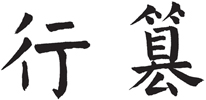11
Implementing Selection

Su “The Tao for employing the military and affecting the people is authority and the steelyard. Authority and the steelyard are the means by which to select the Worthy and choose the good. Yin and yang are the means by which to assemble the masses and engage the enemy. First you must correct the balance, then the weights, and then they will have already attained the standard. This is referred to as being inexhaustible. Evaluate talent and performance by weighing them with the standard, solely to determine what is appropriate.
“Private and state wealth are one. Now among the people there are those who have insufficient longevity but an excess of material goods, and those who have insufficient material goods but an excess of longevity. Only enlightened kings and extraordinary men know this, and therefore can retain them. The dead will not find it odious, those from whom it is taken will not be resentful. This is the inexhaustible Tao. When properly implemented, the people will all exhaust their strength. Those near the ruler will not commit thievery, those far away will not be dilatory.
“When material goods are plentiful there will be contention; when there is contention the people will not regard their superiors as Virtuous. When goods are few they will incline toward their superiors; when they incline toward them then All under Heaven will respect them. If what the people seek is the means by which I seek their performance, this will be the basis for the military’s endurance. In employing the army this is the state’s treasure.”
COMMENTARY
This brief chapter is fraught with problems, causing the commentators to offer widely divergent interpretations for both individual sentences and the chapter’s overall meaning. Apart from the obviously damaged portions, in several places it appears the original copyist may have forgotten characters or even lost paragraphs. The first paragraph is reasonably clear: in order to effectively select and employ men, standards must be employed. Appropriate standards make it possible not only to judge an individual’s abilities and moral qualifications, but also his character and personal inclinations. Although various criteria and impromptu tests for evaluating men are found throughout the military classics, only Sun Pin, in common with the Legalist Lord Shang who was active in his era, made the concept of employing standards explicit.
The reference to yin and yang in the first section of the chapter commands attention. Unfortunately Sun Pin has not indicated what sort of concrete measures they would entail; however, between them yin and yang of course encompass all possible government policies, tactics of battle, and methods for employing men. Yin may well refer to coercive measures, the dark virtue of government, and yang to rewards and incentives, the positive side. As translated, the basis—authority and the steelyard—would subsume rewards and punishments, commonly recognized as the twin handles of power in antiquity, under the ruler’s authority. Without the power to punish and reward, his authority would lack an effective foundation, his commands would be unenforceable, and his appointees unaccountable.
The second paragraph of “Implementing Selection” contains some statements of possibly great historical import depending upon how the sentences are understood. The translation is fairly literal, suggesting the enigmatic character of the original. The first sentence, “private and state wealth are one,” expresses Sun Pin’s view that there should not be any distinction between state and personal material wealth. Rather, utilizing all sources of wealth for government ends, including military activities, is critical. Policies that exploit the imbalance between goods and longevity, between possession and desire, that marks human existence will successfully provide the state with inexhaustible resources. While most commentators would understand the sentence, “Now among the people there are those who have insufficient longevity but an excess of material goods, and those who have insufficient material goods but an excess of longevity,” as describing a felt dissatisfaction with either life or mate- rial goods, Sun Pin appears to be simply contrasting their paired nature. Obviously people with excess wealth have to be motivated in other ways, while those lacking the essentials for life can be coerced to disregard their lives in the pursuit of government rewards. Assuming the introduction of an appropriate system of rewards and punishments, men who die under arms will not resent their deaths, and those from whom goods are confiscated will not complain. This will create a tranquil, orderly society in which the people all exhaust their energies, while not presuming upon their positions to commit thievery.
The last paragraph is interesting for it suggests a doctrine starkly in contrast to the prevalent Warring States viewpoint, that scarcity inevitably leads to conflict, because Sun Pin appears to believe that a plethora of material goods stimulates people to disregard the incentives offered by government, slighting the “Virtue” of the ruler. Conversely, when goods are scarce and mainly available through government incentives, people will be compelled to focus upon them and will accordingly value them. Moreover, they will be forced to compete for them by behaving in a structured way, whereas when goods are widely available they can freely accumulate and contend for them among themselves. Since only the state has the resources to satisfy the people, as long as its incentives remain credible and timely, it can manipulate the populace through their desires and attain the ultimate objective of military thinkers—mounting extensive campaign efforts that compel men to endure prolonged exposure to hardship and danger.